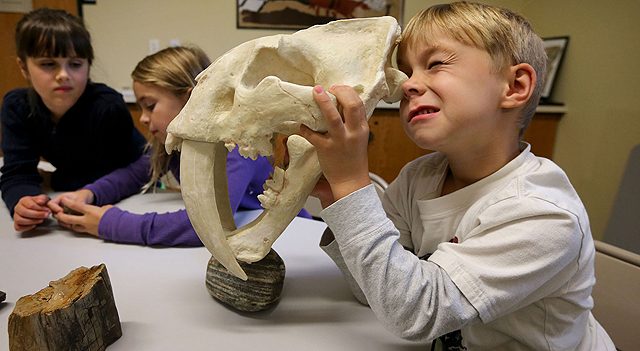Feds dig up $2 million to support networking needs of amateur fossil fans

FOSSIL FUNDING: The University of Florida landed $2 million in taxpayer support to assist fossil hobbyists in their networking efforts.
By William Patrick | Florida Watchdog
TALLAHASSEE, Fla. — Fossil lovers now have one more way to link up and talk about dinosaurs thanks to a mammoth-sized federal grant.
Critics call it more buried treasure.
The University of Florida broke ground earlier this year on a taxpayer-supported initiative purporting to connect amateur fossil enthusiasts across the country with each other and professional aficionados through a new online communication network.
The cost: $2 million.
The plan is a mouthful, called Fostering Opportunities for Synergistic STEM in Informal Learners, or FOSSIL, (STEM is an acronym for Science Technology Engineering and Math).
Simply put, it consists of a user-friendly website, social media outreach and event get-togethers. The website — the networking hub — hosts mainly contact lists, event information and a newsletter.
Funding recipients call it a game-changer.
“I had this idea of a web-based education community that connects people with a shared interested in paleontology,” Bruce MacFadden, vertebrate paleontology curator at the Florida Museum of Natural History on the UF campus, said in February when the public funding was announced.
Paleontology is the study of fossilized plants and animals.
University researchers cited a need for the funding, based on their own research, to connect independent fossil clubs across the country the same way other science-hobbyist groups are connected, such as birdwatchers. The National Science Foundation, a federal agency, agreed and is sending $1.97 million payable through 2017.
Critics question whether the government should be funding hobbyists at all.
FOSSIL landed in U.S. Sen. Tom Coburn’s, R-Okla., 2014 Wastebook — a list of the federal government’s most wasteful projects, released last month.
BURIED TREASURE: U.S. Sen Tom Coburn’s 2014 Wastebook pegged the fossil-friendly largesse as a waste of taxpayer resources.
The report questions FOSSIL’s basic usefulness as related websites and funding grants already exist.
According to the project’s coordinators, one of the long-term goals is to create a “big data” record of digitized fossil specimens. At least one similar plan is already in the works.
“The data collection efforts may also duplicate those already underway with National Science Foundation funding, such as the Paleobiology Database for collecting fossil data. That project received a $693,931 grant in 2010,” the report states.
Social media traction also has been scant.
Judging by Facebook and Twitter numbers, the project isn’t exactly digging up $2 million worth of interest, yet. Since going online in Oct. 2013, FOSSIL’s Facebook page has just 814 members. Its Twitter account has 310 followers and has sent 365 tweets.
One reason might be the popularity of other fossil devotee websites. The Fossil Forum, a global paleontology website, boasts 15,107 members, 3,395 Facebook followers and more than a half a million website posts. Others related sites include the Paleontology Portal, the Center of Excellence in Paleontology and the American Museum of Natural History.
FOSSIL does have a competitive advantage when it comes to paying for event attendees.
For the stated purpose of facilitating relationship building, university researchers hosted amateur paleontologists at a Gainesville convention in February.
“This is the first time that fossil enthusiasts have been invited, and the grant is paying for them to attend,” said MacFadden, the project’s co-developer. “There are a lot of wonderful amateur paleontologists in North America and this is a very exciting opportunity.”
University researchers say connecting amateurs with professionals will lead to long-term gains, but it won’t include many tuition-paying students.
“Few members of fossil clubs are students, so this is also a way that people who share an interest and love of fossils can continue to learn outside of the classroom throughout their lives,” MacFadden added.
FOSSIL leaders say they’ll use lessons learned over the course of fossil community engagement back in university classrooms.
More measurable goals don’t seem to be a part of the plan. One faculty member said success will be determined subjectively.
“We will assess the impact of FOSSIL by evaluating the structure of the community over time as well as the participation and perceptions of its members,” said Kent Crippen, UF associate professor of STEM education.







